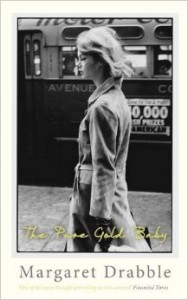 Published by Canongate Books 7 November 2013 UK
Published by Canongate Books 7 November 2013 UK
Houghton Mifflin Harcourt 1 October 2013 US
304pp, hardback, £16.99/$18.25
Reviewed by Elsbeth Lindner
In an era of endless novelty, there is a great deal to be said in favour of maturity and the broad, sustaining arms of experience. Margaret Drabble’s new novel radiates the kind of intelligent ability, breadth and wry insight that comes with a lifetime’s practice of thinking and writing. Reading it as relaxingly satisfying as sinking into luxury upholstery.
Less a story, more a sequence of minor events and observations on an impressive range of subjects, the novel develops outwards from the birth of Anna, a Down’s syndrome child and the daughter of unmarried London anthropologist Jess. Anna, the pure gold baby who will never develop or change, plays her own role in the proceedings, but also serves as the gateway to a multiplicity of topics the book is concerned to track: mental health care; child-rearing; family; relationships; social changes in North London; aging. And then there’s Africa and history, Livingstone and Wordsworth, ethnography and neurology, scholarship and sex. Drabble’s range is remarkable.
As a version of the seven ages of womanhood, her novel offers wisdom of an irresistible kind, whether tracking bladders and libidos or observing female representation in the art of Camille Claudel.
Best of all, though, is the narrative voice as delivered by Nellie, the (fairly) self-effacing friend and observer of Jess and Anna, a cool, sometimes caustic commentator whose aperçus occasionally have the sardonic ring of Fay Weldon.
Long may senior female writers like Drabble – and Weldon and others – continue to ply their craft, harder though it has become for some of them to find publication in these days of debuts by the bright and beautiful, as beady-eyed Nellie might comment.
